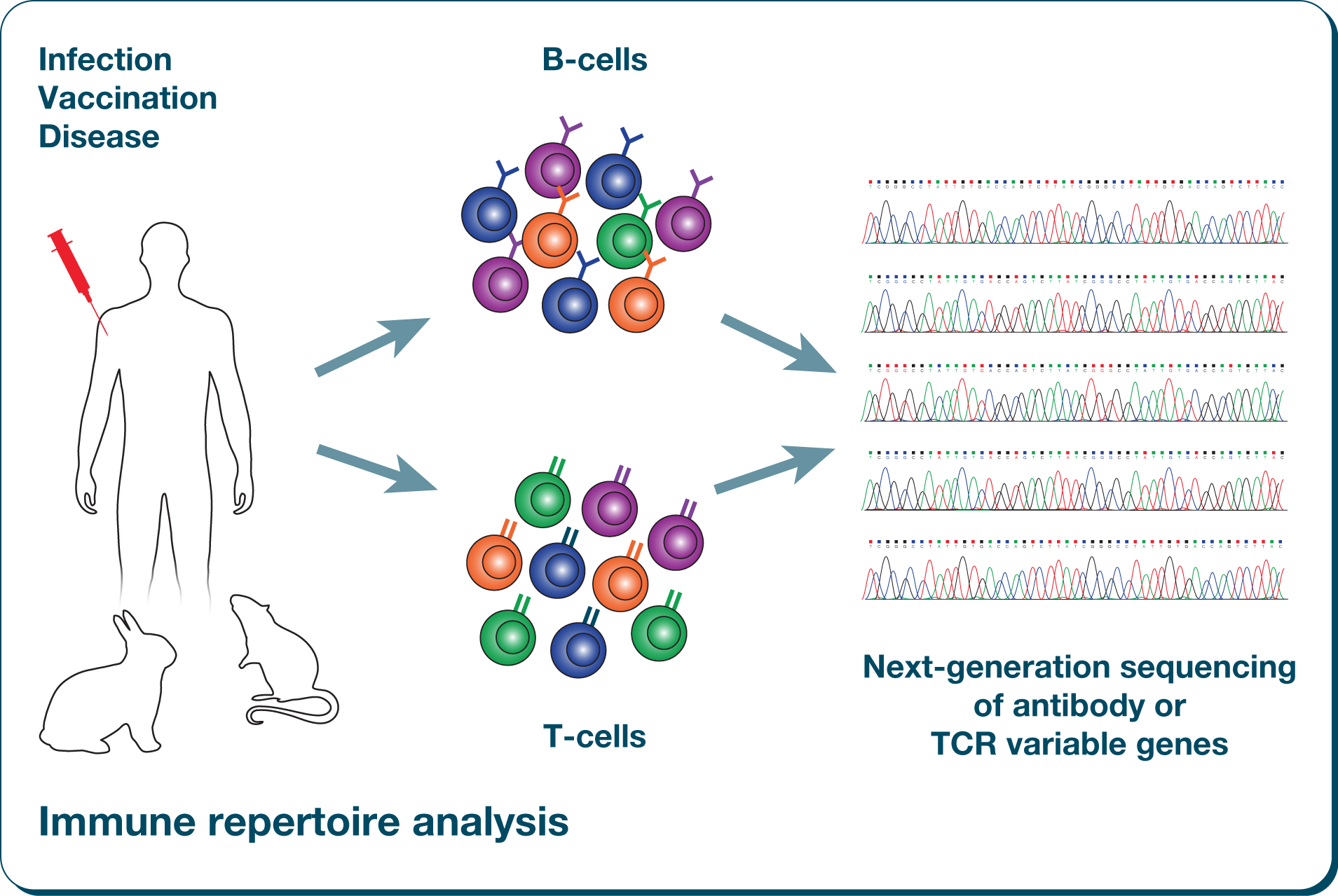Next-generation sequencing (NGS) analysis for immune repertoire profiling
Deep or next-generation sequencing currently revolutionizes the investigation of the immune repertoire, which is a key component of the adaptive immune response. The immune repertoire is the sum of functionally diverse B and T cells of an individual, which is the key determinant of immunological complexity. B and T cells bear specific antigen receptors (T cell receptor and B cell receptor), which specifically detect foreign antigens. When encountering exogenous antigens, T cells bearing immune receptors, which specifically bind to compatible peptide–MHC complexes, or B cells binding by their antigen receptors to exogenous pathogens will expand. This leads to an extensive proliferation of antigen-specific B or T cells and a massive shift in the immune repertoire, which triggers the adaptive immune response. B cells further undergo a somatic hypermutation and affinity maturation process of their antigen receptors. Traditional methods of immune profiling like spectratyping or Sanger sequencing were very ineffective due to the very limited number of datasets. In contrast, next-generation sequencing of immune repertoires provides millions of antigen receptor sequences and therefore a truly in depth picture of the current immune status of an individual.
Next-generation sequencing analysis of the immune repertoire:

The adaptive immune system plays a key role in the body’s defense against infectious pathogens, but is also the cause of unwanted disease events like autoimmunity or graft rejection. The profiling of the immune repertoire is crucial to understand the mechanisms of adaptive immunity and supports the development of antibodies or vaccines, clinical diagnosis, treatment, and prevention.
The analysis of next-generation sequencing data efficiently supports immune profiling by:
- Investigation of the immune status by NGS
- Monitoring dynamic changes of the immune repertoire
- Development of novel antibodies, vaccines, therapies & diagnostics
Investigation of the immune status by NGS
The immune repertoire is not just a snapshot of the dynamic alterations of the adaptive immune response at a given time but also an individual history of the encounters with foreign antigens of a person during his life. After the immune system has handled a particular threat, memory cells develop, which stand-by, if another identical threat should rise in the future. This immune memory can be investigated by profiling the immune system with next-generation sequencing. The ultra-high resolution of NGS allows seeking for specific sequences that indicate exposure to a virus, fungus, other infectious agents, or a specific sequence associated with autoimmune disease.
Monitoring dynamic changes of the immune repertoire
Another application of next-generation sequencing is the monitoring of changes in the immune repertoire over a certain period. Specific responses in animals or humans are analyzed during the progression of a disease, a treatment, or a challenge with an antigen. The investigation can focus on an individual at different points in time or check for example healthy against diseased populations or treated against placebo-controlled groups. The comparison of NGS data sets by advanced bioinformatics leads to new insights in the mechanisms of the adaptive immune response, the markers of a disease, or the effectiveness of a treatment.
Development of antibodies, vaccines, therapies & diagnostics
High-resolution characterization of the antibody or T cell repertoire likewise supports the development of new therapies and diagnostics. Profiling the antigen receptors by NGS supports the identification of novel antibodies or the development of effective vaccines and adjuvant formulations that can trigger a sufficient immunogenicity. Moreover, the in depth comparison of diseased and healthy states is the basis for the discovery of specific biomarkers. Immune profiling by next-generation sequencing is therefore an invaluable relief in research and development of therapeutic antibodies, immunotherapies, vaccines or diagnostics.
Download the application note for NGS data analysis and BCR immune profiling for a more detailed overview. AptaIT is providing innovative solutions to help researchers to exploit the full potential of next-generation sequencing: Our easy-to-use software AptaAnalyzer™ and custom NGS data analysis services.

